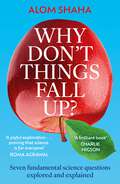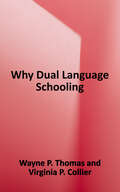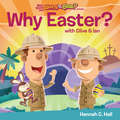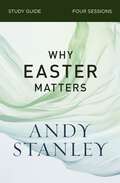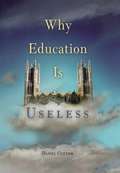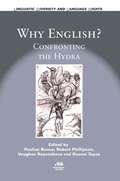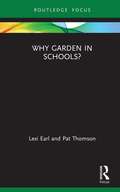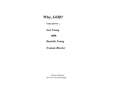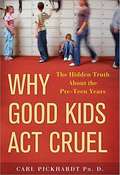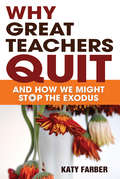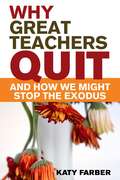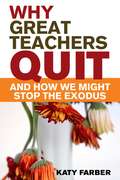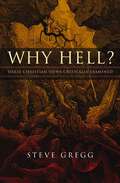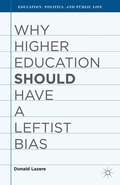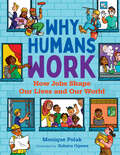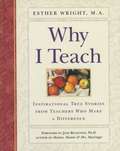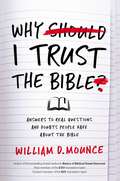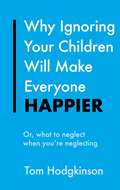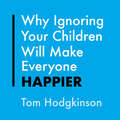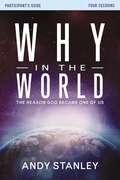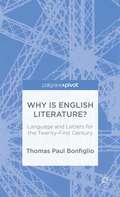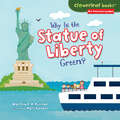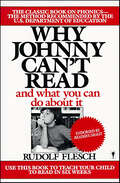- Table View
- List View
Why Don't Things Fall Up?: and Six Other Science Lessons You Missed at School
by Alom Shaha'A book of quiet wonder.' Ian Dunt 'I have learnt (and remembered) so much, and so easily. It's the mango ice cream of science books.' Hilary McKay'Everything Alom writes is a joy to ponder, his love of science is utterly contagious, the perfect guide through things that might perplex.' Robin Ince'A joyful exploration of fundamental questions about our world; Shaha proves that science is for everyone!' Roma Agrawal'Friendly, informative and such fun to read.' Christopher Edge 'Alom Shaha is the science teacher many people will wish they had but didn't.' Philip Ball'Here is the teacher you'll wish you had at school.' Jim S. Al-Khalili CBE Has a child - or anyone else - ever asked you why the sky is blue? Could you explain why ice cream melts? Have you forgotten why scientists think the universe started with a Big Bang, and do you understand the difference between respiration and breathing?Why Don't Things Fall Up? will gently remind you of everything you may have learnt once upon a time, but have somehow forgotten along the way. If you've ever changed the subject when a child has asked for homework help, or if you have the curiosity of a seven year old yourself, or if you know everything but have forgotten the basics or don't want to know anything except the basics - then this is the book for you. Using questions asked by children as a starting point, Alom Shaha (who has spent over two decades trying to help people of all ages understand this stuff) takes us on a tour of the "big ideas" of science from his unique perspective. His experience as a dad, a teacher and science communicator means he knows exactly what people don't know -and especially the misconceptions and other intellectual hurdles which prevent us from grasping key ideas. Combining his proven skill for explaining science with storytelling and flashbacks to school experiments, Why Don't Things Fall Up? reminds us that science is not just for scientists - it's a human endeavour that enriches all our lives.
Why Dual Language Schooling
by Wayne P. Thomas Virginia P. CollierThis book provides the justification and research foundation for why the individual and/or community chooses dual language education. As their fourth book in the series, Drs. Collier and Thomas share foundational knowledge and experience with every family, board of education, business and community member who seeks to understand the exciting promise of K-12 dual language education.
Why Easter?
by Hannah C. HallBased on the bestselling video series What's in the Bible?, Why Easter? features a foundational faith concept and charming illustrations to help parents teach preschoolers why we celebrate Easter.Clive laughed. ". . .But colorful eggs and fluffy bunnies aren't what Easter is about anyway.""They aren't?" Ian asked. "Why do we celebrate Easter then?"As brothers Clive and Ian dye Easter eggs and discuss their favorite things about the holiday-the Easter pony . . . or is it a bunny . . . or perhaps an Easter chicken?-Clive explains that Easter is about more than colorful eggs and fluffy bunnies. So why do we celebrate Easter? The answer is as exciting as it is wonderful: because of Jesus!
Why Easter Matters Bible Study Guide
by Andy StanleyHave you ever been at odds with God?Have you resisted, defied, or tried to bargain your way out of what you thought God wanted?You aren&’t alone. Scripture documents similar stories.In this Easter Study Andy Stanley looks at some of the people whose lives intersected with Jesus in the weeks leading to his crucifixion. Each of them had an agenda that put them at odds with God and Jesus. As you&’ll see, there&’s a little bit of them in all of us.The Why Easter Matters Study Guide includes session overviews, video teaching notes, discussion questions, personal reflection material, and a leader&’s guide.Sessions include:The High Cost of Following ChristThe Risk of Surrendering to GodThe God Who Can Be TrustedThe Foundation of Our FaithDesigned for use with the Who Needs Christmas / Why Easter Matters Video Study (9780310121121), sold separately. Streaming video also available.
Why Education Is Useless
by Daniel CottomEducation is useless because it destroys our common sense, because it isolates us from the rest of humanity, because it hardens our hearts and swells our heads. Bookish persons have long been subjects of suspicion and contempt and nowhere more so, perhaps, than in the United States during the past twenty years.Critics of education point to the Nazism of Martin Heidegger, for example, to assert the inhumanity of highly learned people; they contend that an oppressive form of identity politics has taken over the academy and complain that the art world has been overrun by culturally privileged elitists. There are always, it seems, far more reasons to disparage the ivory tower than to honor it. The uselessness of education, particularly in the humanities, is a pervasive theme in Western cultural history.With wit and precision, Why Education Is Useless engages those who attack learning by focusing on topics such as the nature of humanity, love, beauty, and identity as well as academic scandals, identity politics, multiculturalism, and the corporatization of academe. Asserting that hostility toward education cannot be dismissed as the reaction of barbarians, fools, and nihilists, Daniel Cottom brings a fresh perspective to all these topics while still making the debates about them comprehensible to those who are not academic insiders.A brilliant and provocative work of cultural argument and analysis, Why Education Is Useless brings in materials from literature, philosophy, art, film, and other fields and proceeds from the assumption that hostility to education is an extremely complex phenomenon, both historically and in contemporary American life. According to Cottom, we must understand the perdurable appeal of this antagonism if we are to have any chance of recognizing its manifestations--and countering them.Ranging in reference from Montaigne to George Bush, from Sappho to Timothy McVeigh, Why Education Is Useless is a lively investigation of a notion that has persisted from antiquity through the Renaissance and into the modern era, when the debate over the relative advantages of a liberal and a useful education first arose. Facing head on the conception of utility articulated in the nineteenth century by John Stuart Mill, and directly opposing the hostile conceptions of inutility that have been popularized in recent decades by such ideologues as Allan Bloom, Harold Bloom, and John Ellis, Cottom contends that education must indeed be "useless" if it is to be worthy of its name.
Why English?: Confronting the Hydra
by Robert Phillipson Pauline BunceThis book explores the ways and means by which English threatens the vitality and diversity of other languages and cultures in the modern world. Using the metaphor of the Hydra monster from ancient Greek mythology, it explores the use and misuse of English in a wide range of contexts, revealing how the dominance of English is being confronted and counteracted around the globe. The authors explore the language policy challenges for governments and education systems at all levels, and show how changing the role of English can lead to greater success in education for a larger proportion of children. Through personal accounts, poems, essays and case studies, the book calls for greater efforts to ensure the maintenance of the world's linguistic and cultural diversity.
Why Garden in Schools? (Routledge Spaces of Childhood and Youth Series)
by Lexi Earl Pat ThomsonThis book delves into the complex history of the gardening movement in schools and examines the question why gardens should be built in schools. It offers practical guidance for teachers to begin thinking about how to approach educational gardening. A resurgence of interest in school gardens is linked to concerns about children’s health, food knowledge, lack of outdoor play and contact with the natural world. This book warns against simplistic one-best approaches and makes a case about the complexity of gardening in schools. It is the first critical attempt to address the complex and conflicting notions about school gardens and to tackle the question ‘what is the problem to which school gardens are the answer?’ Examining the educational theory in which gardening has been explained and advocated, the book explores the way contemporary gardens research has been conducted with specific questions such as ‘what works well in school gardens?’ Based on case studies of a school establishing a garden and another one maintaining a garden, chapters look at the way in which schools come to frame their gardens. The authors suggest that there are four issues to consider when setting up a school garden or evaluating a pre-existing one – wider social context, public policy, the whole school, and the formal and informal curriculum. The book ends with a call for consideration of the ways in which school gardens can be built, the myriad practices that constitute an educational garden space and the challenges of maintaining a school garden over the long term. It will be of interest to teachers in primary schools, as well as a key point of reference for scholars, academics and students researching school gardens.
Why, God? Come and See
by Joel Young Danielle Young Truman BlockerWhy, God? Come and See ... answers difficult questions in a captivating and enlightening manner. These answers make it easier to trust GOD and to love HIM, when you see HIM for WHO HE truly IS. Unique to our book is the fact that most of the questions are answered from three perspectives, the serious Bible student or scholar, the growing Christian or enquiring mind, and the gut-level man-on-the-street.
Why Good Kids Act Cruel
by Carl PickhardtWhy do many good children treat one another so badly? This is a question parents eventually face and most start thinking about as their children prepare for high school. But the hard truth is, high school is too late. The pre-teen years are actually when it begins, when the cruelty is even worse, causing more anxiety and stress for children already facing an enormous amount of change in their lives. Early adolescence is a phase of anxiety, of uncertainty, of insecurity. To make matters worse, although all kids are going through the same transformation, none of them share what it is like, each feeling alone, isolated, and unique. The result is that even fantastic kids will do and say harmful things. Why Good Kids Act Cruel is the first book to give you an understanding of why cruelty happens during these years and how to help your child through these difficult times. She didn't make it; she was born with it: her nose. And in elementary school that was okay. But now in seventh grade, sometimes other girls would tease, "What's the matter Blaise, you having a bad nose day?" Looking in the mirror before school, she could see what they were making fun of. One day, a girl she had beaten out for a starting spot on the basketball team threw a nickname at her: "Snout. " Some of the girl's friends picked it up, and it stuck. Blaise acted like she didn't care. But as she started to hate her nose, she started to hate herself.
Why Great Teachers Quit: And How We Might Stop the Exodus
by Katherine FarberLearn why today’s best teachers are leaving—from the teachers themselves More talented teachers are leaving the profession than ever before. Drawing on in-depth interviews, Farber presents an in-the-trenches view of the classroom exodus and how schools can turn the tide, focusing on: Challenges to teacher endurance, including tight budgets, difficult parents, unsafe schools, inadequate pay, and lack of respect Strategies veteran teachers use to make sure the joys of teaching outweigh the frustrations Success stories from individual schools and districts that have found solutions to these challenges Recommendations for creating a school environment that fosters teacher retention
Why Great Teachers Quit and How We Might Stop the Exodus
by Katy FarberLearn why today's best teachers are leaving-from the teachers themselves.Low pay, increased responsibilities, and high-stakes standardized testing-these are just some of the reasons why more talented teachers are leaving the profession than ever before. Drawing on in-depth interviews with teachers all over the country, Katy Farber presents an in-the-trenches view of the classroom exodus and uncovers ways that schools can turn the tide.Farber's findings, which have been featured on Education Talk Radio, Vermont Public Radio, and in the Huffington Post, paint a sometimes shocking picture of life in today's schools, taking a frank look at Challenges to teacher endurance, including tight budgets, difficult parents, standardized testing, unsafe schools, inadequate pay, and lack of respect Strategies veteran teachers use to make sure the joys of teaching outweigh the frustrations Success stories from individual schools and districts that have found solutions to these challenges Recommendations for creating a school environment that fosters teacher retentionFeaturing clear analysis and concrete suggestions for administrators and policy makers, Why Great Teachers Quit takes you to the front lines of the fight to keep great teachers where they belong: in the classroom.
Why Great Teachers Quit and How We Might Stop the Exodus: And How We Might Stop The Exodus
by Katy FarberLearn why today’s best teachers are leaving-from the teachers themselves.Low pay, increased responsibilities, and high-stakes standardized testing-these are just some of the reasons why more talented teachers are leaving the profession than ever before. Drawing on in-depth interviews with teachers all over the country, Katy Farber presents an in-the-trenches view of the classroom exodus and uncovers ways that schools can turn the tide.Farber's findings, which have been featured on Education Talk Radio, Vermont Public Radio, and in the Huffington Post, paint a sometimes shocking picture of life in today's schools, taking a frank look at Challenges to teacher endurance, including tight budgets, difficult parents, standardized testing, unsafe schools, inadequate pay, and lack of respect Strategies veteran teachers use to make sure the joys of teaching outweigh the frustrations Success stories from individual schools and districts that have found solutions to these challenges Recommendations for creating a school environment that fosters teacher retentionFeaturing clear analysis and concrete suggestions for administrators and policy makers, Why Great Teachers Quit takes you to the front lines of the fight to keep great teachers where they belong: in the classroom.
Why Hell?: Three Christian Views Critically Examined
by Steve GreggMost people believe that hell is the final state of the condemned following the final judgment. At the same time, many people cannot comprehend why God created hell for the unsaved. Respected church fathers held a variety of views dating back to the early centuries of the church. This book explains views on why hell exists: unending suffering, the annihilation of the unrepentant, and the rehabilitation of the lost. Most Christians are unaware of the scriptural basis for each of these positions. Why Hell? is meant to educate the interested reader without advocating for any one point of view. The following are some of the book's features:Biblical vocabulary of hell and positions held throughout early Christian historyPositive cases presented on three perspectives: traditionalist, conditionalist, and restorationistCritiques of each viewHelpful charts at the back of the book that summarize and cross-examine the arguments for each viewSteve Gregg provides food for thought for both trained theologians and serious Christian readers who want all the data and then consider for themselves the consequences of three Christian perspectives on hell.
Why Higher Education Should Have A Leftist Bias
by Donald LazerePresenting a thoughtful justification for the left in American education, Donald Lazere argues that to teach students rhetoric and critical thinking, key components of a humanist education, educators must discuss and teach students to grapple with the conservative bias in academia, the media, and politics that is considered to be the status quo.
Why Humans Work: How Jobs Shape Our Lives and Our World (Orca Think #6)
by Monique PolakWhat do you want to be when you grow up? I bet you've been asked that question before. But have you ever thought about why humans work? There are almost 3.5 billion people working in the world today, and that number is growing. In Why Do We Work? author Monique Polak investigates the past, present and future of jobs, including how work has also been shaped by discrimination, privilege and child labor. Meet a variety of working professionals and explore why we have careers, vocations and professions. How is the way we work changing, and what will it look like in the future?
Why I Teach: Inspirational True Stories from Teachers Who Make a Difference
by Esther WrightA Celebration of the Power of TeachingThere is a moment for most teachers when the lure of working with kids surpasses all logic: You know, you just know, that you are meant to teach. But in the day-to-day crush of details and bus duty, politics and paperwork, or kids without their homework for the eighth day in a row, life can erode passion and distract you from your sense of purpose. This collection of stories from teachers everywhere will remind you of those magic moments when a light goes on in the eyes of a child, when resistance breaks, when hearts connect--moments that make the challenges of teaching worth every second and remind you of why you are here in the first place.From the Trade Paperback edition.
Why I Trust the Bible: Answers to Real Questions and Doubts People Have about the Bible
by William D. MounceA Clear Guide to Help Readers Understand Why They Can Trust the BibleWe are often told we can no longer assume that the Bible is trustworthy. From social media memes to popular scholarship, so many attacks have been launched on the believability of Scripture that many have serious questions about the Bible, such as:Did Jesus actually live?Did the biblical writers invent their message?How can we trust the gospels since they were written so long after Jesus lived?How can we believe a Bible that is full of internal contradictions with itself and external contradictions with science?Aren't the biblical manuscripts we have just copies of copies that are so corrupted they don't represent what the original authors wrote?Why should we believe the books that are in the Bible, since many good ones were left out, like the Gospel of Thomas?Why trust the Bible when there are so many contradictory translations of it?If you find yourself unable to answer questions such as these, but wanting to, Why I Trust the Bible by eminent Bible scholar and translator William Mounce is for you. These questions and more are discussed and answered in a reasoned, definitive, and winsome way.The truth is that the Bible is better attested and more defensible today than it ever has been. Questions about the Bible are perhaps the most significant challenge confronting Christian faith today, but they can be answered well and in a way which will lead to a deeper appreciation for the truth and ongoing relevance of the Bible.
Why Ignoring Your Children Will Make Everyone Happier: Or, What to Neglect When You're Neglecting (Everything Bad is Good for You #1)
by Tom HodgkinsonWe all obsess about worrying less, but worrying can actually be good for you. Similarly we strive to be proactive and fast - but aren't there hidden benefits to procrastinating? The last thing a parent is meant to do is neglect their offspring, but children do amazing things when you just leave them alone. And at work we spend hours frantically brainstorming, but isn't there a benefit to just lazily staring out of the window? EVERYTHING BAD IS GOOD FOR YOU is a new series of short pieces dedicated to the much-maligned personality traits that we should actually be promoting. Just as Susan Cain's QUIET showed that introversion is actually a superpower and Sarah Knight made us all realise that not giving a f**k can actually improve our lives, these surprising and entertaining audiobooks will celebrate our perceived flaws - and show why embracing rather than supressing them can be the difference between failure and success.
Why Ignoring Your Children Will Make Everyone Happier: Or, What to Neglect When You're Neglecting
by Tom HodgkinsonWe all obsess about worrying less, but worrying can actually be good for you. Similarly we strive to be proactive and fast - but aren't there hidden benefits to procrastinating? The last thing a parent is meant to do is neglect their offspring, but children do amazing things when you just leave them alone. And at work we spend hours frantically brainstorming, but isn't there a benefit to just lazily staring out of the window? EVERYTHING BAD IS GOOD FOR YOU is a new series of short pieces dedicated to the much-maligned personality traits that we should actually be promoting. Just as Susan Cain's QUIET showed that introversion is actually a superpower and Sarah Knight made us all realise that not giving a f**k can actually improve our lives, these surprising and entertaining audiobooks will celebrate our perceived flaws - and show why embracing rather than supressing them can be the difference between failure and success.
Why Ignoring Your Children Will Make Everyone Happier: Or, What to Neglect When You're Neglecting (Everything Bad is Good for You #1)
by Tom HodgkinsonWe all obsess about worrying less, but worrying can actually be good for you. Similarly we strive to be proactive and fast - but aren't there hidden benefits to procrastinating? The last thing a parent is meant to do is neglect their offspring, but children do amazing things when you just leave them alone. And at work we spend hours frantically brainstorming, but isn't there a benefit to just lazily staring out of the window? EVERYTHING BAD IS GOOD FOR YOU is a new series of short audiobooks dedicated to the much-maligned personality traits that we should actually be promoting. Just as Susan Cain's QUIET showed that introversion is actually a superpower and Sarah Knight made us all realise that not giving a f**k can actually improve our lives, these surprising and entertaining audiobooks will celebrate our perceived flaws - and show why embracing rather than supressing them can be the difference between failure and success.(P) 2019 Hodder & Stoughton Ltd
Why in the World Participant's Guide: The Reason God Became One of Us
by Andy StanleyIn this four-session video Bible study (DVD/digital video sold separately), bestselling author and pastor Andy Stanley takes a closer look at one of the unique things Christians believe: God became one of us. Why in the world would God do that? Why would God leave the comfort and recognition of heaven to live on this ball of dirt in a time before morphine and indoor plumbing when the best of conditions barely paralleled the worst of modern-day conditions? Why?We think we know why He died. But what compelled him to live as one of us?Sessions include:To Communicate and DemonstrateLike Son, Like FatherClasslessPutting Religion in Its PlaceAs the founder of North Point Ministries—comprised of six churches in the Atlanta area serving more than 36,000 people weekly, as well as a network of 30 churches around the globe—Andy Stanley is uniquely positioned to reach an engaged and ever-growing ministry.Designed for use with the Why in the World Video Study (sold separately).
Why Is English Literature?
by Thomas Paul BonfiglioWhy is English synonymous with literature in the United States? Bonfiglio contextualizes the rising hegemony of English within the anti-labor, anti-immigration, xenophobic, mercantile, militarist, and technocratic ideologies that arose in the US in the first half of twentieth century.
Why Is the Statue of Liberty Green? (Cloverleaf Books (tm) -- Our American Symbols Ser.)
by Martha E. Rustad Holli CongerDo you know that the Statue of Liberty hasn't always looked green? Or that the first torch had to be replaced? Lady Liberty has been an important US symbol for more than one hundred years. Join Mrs. Bolt's class as they visit the statue and learn where the statue came from, how she was built, and what American ideas she represents.
Why Johnny Can't Read: And What You Can Do About It
by Rudolf FleschThe classic bestseller on phonics—the method that can teach children to read in six weeks.In 1955, Dr. Rudolf Flesch published Why Johnny Can’t Read, a sharp criticism of teaching methods being used in American schools—methods, he argued, that were failing children and lowering the nation’s literacy rates in comparison to other countries. He championed a return to phonics, which emphasized learning letters and their sounds rather than trying to memorize whole words and recognize them on sight. Time magazine reported that the book would “shock many a US parent and educator”—and indeed, it remained a bestseller for thirty-seven weeks and changed the way reading was taught.Today, this method of teaching is recommended by the U.S. Department of Education, and for parents who want to teach their child to read—whether in a homeschooling setting, in the preschool years, or as a supplement to classroom lessons—Why Johnny Can’t Read contains complete materials and instructions.“Forthright, clear, and persuasive.” —Language“For use by parents who will be able to help their children at home, with the primer contained in the book.” —Kirkus Reviews
